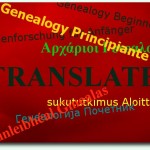Search results
Free Genealogy Translation Services
July 2, 2012 by ramona
Filed under Articles, Genealogy Research Resources, Latest News, Sharing Genealogy Information
 If your ancestors are from Europe, Asia, Russia, South America or another non-English speaking region; you are probably among countless other family tree researchers who will eventually need help translating your genealogy documents.
If your ancestors are from Europe, Asia, Russia, South America or another non-English speaking region; you are probably among countless other family tree researchers who will eventually need help translating your genealogy documents.
Although free online translators have become an abundant resource on the net, when it comes to archaic words, idioms or technical terms they may fall short of expectation.
Live translation services can be costly however; there are some wonderful folks out there who offer genealogy translation services free of charge.
- Linguanaut. Is a site with access to 150 translators, their goal is to connect people in need of a translation with a volunteer translator. To get started just click on Free Translation then choose your language and they will match you up with a translator. (Short non-commercial translations only).
- Freelang: is a fantastic resource with hundreds of volunteers that offers free “short” translations for non-commercial reasons.
To use their service all you need to do is:
- select a language
- select a translator
- fill out their contact form
Your translator will contact you via email with your translation.
- Cucumis: is based on the exchange of services for the benefit of all. This service works on a point system, for example; you can earn points by translating something for another member. However, even if you only speak one language you can still earn points simply by signing up
- WikiTranslation. This site is the simplest to use. All you need to do is fill out their translation request form and someone should get back to you via email.
Of course, there are other language specific services available as well and a quick Google search should give you a list of sites in no time. Happy ancestor hunting.
Black Sheep Ancestors
May 11, 2012 by ramona
Filed under Articles, Genealogy Research Resources, Latest News, Sharing Genealogy Information
 Pirates, Outlaws and Ne’er do wells; it would be uncommon to research any family tree without finding at least one skeleton in the closet.
Pirates, Outlaws and Ne’er do wells; it would be uncommon to research any family tree without finding at least one skeleton in the closet.
Ancestors with a criminal record can range from unfortunate debtors who paid a price for being poor to thieves and pickpockets or even those executed for murder. Although none of us wants to find we descended from a cold-blooded killer, having a rogue in the family tree does add a little excitement.
Throughout history there have been criminals and alongside them court systems and institutions for dealing with them. With prisons and courts come the records they generate and those records are a wonderful resource for genealogists and family historians looking for a missing ancestor.
Information found in court and prison records can include the accused or inmate’s next of kin, name and age. Whether or not they could read, their trade, the reason they were in trouble and the sentence they received for their crime.
Finding Criminals Past
Blacksheep Ancestors is a free genealogy site filled with prison lists and court records that encompass Great Britain, Canada and the US.
One fantastic and free searchable list is The Proceedings of the Old Bailey, 1674-1913, which has a fully searchable database that contains 197,745 criminal trials from London’s central criminal court.
The site also has links to the biographies of petty and master criminals alike where you can read the stories about:
- Catherine Hayes, who in 1725 conspired with her lovers to kill her husband and was tried, convicted and executed for her crime.
- The Fourth Earl Shirley, Laurence Ferrers, who was the last peer of the realm convicted as a common criminal and hanged
- Eliza Fenning, a young cook who was found guilty of the attempted murder of her employers by poisoning their food. Up until the moment Eliza was put to death, she claimed her innocence.
Whether you have an ancestor who was a minor miscreant or someone with an infamous criminal past, Blacksheep Ancestors is a fascinating genealogy website dedicated to helping you trace the romantic rogues and villainous scoundrels in your ancestral line. Share your Black sheep story on Genealogy in General.
